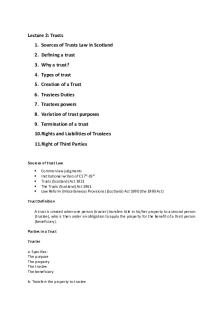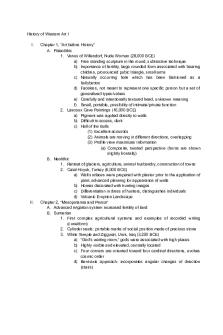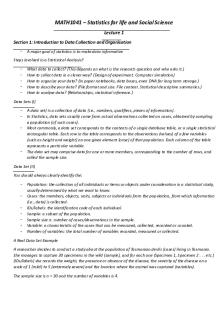Virgil Eclogues notes PDF

| Title | Virgil Eclogues notes |
|---|---|
| Author | Erik Liddell |
| Course | Classical Humanities |
| Institution | Eastern Kentucky University |
| Pages | 4 |
| File Size | 129.1 KB |
| File Type | |
| Total Downloads | 84 |
| Total Views | 143 |
Summary
Download Virgil Eclogues notes PDF
Description
Horace, Vergil, and Varius at the house of Maecenas, by Jalabert, France, 19th c. Publius Vergilius Maro, Eclogues (or Bucolics), ca. 40 BCE (44-38?, maybe as late as 35?) Series of pastoral poems, inspired by the Idylls of the Greek Alexandrian poet Theocritus (3rd c. BCE), but with more political and social allusions. Written in dactylic hexameter (long-short-short x 6), in an intermediate register between high and low forms, “an idiosyncratic space between the grandiloquent speech of epic and tragedy and the lowly conversational tone of comedy” (Gregson Davis, “Introduction” to Virgil’s first major work, written during the time of the Civil Wars, before Augustus’ decisive victory in Actium, it bears the hallmarks of a society in an uncertain and anxious moment of transition, looking to an idealized past and hoping again for a brighter future. Virgil published the Eclogues prior to his introduction to the wealthy patron, Maecenas, and his circle of Augustan supporters in Rome, who were to go on to support him in his later works, which included the Georgics, a long poem about agriculture, and the reworking of national myths in the Aeneid, published posthumously. The poems in the Eclogues (which means “Selections”) stand on their own, but are believed by scholars to also be intended to work as a book, developing a number of important themes evoking a charming, tranquil, virtuous, traditional, authentically Italian mode of life born of the land, a mode of life and set of virtues that were felt to be threatened and maybe disappearing. At the same time, Eclogue 4 (an homage to Octavian) envisions a return of the Golden Age with the birth of a new generation. In this sense, again, it is notable that the argument of the collection is complicated, and there are unresolved tensions between the nostalgic elements of the world of Arcadia as presented and the ever encroaching realities of contemporary Roman life – the world of politics and power. So, on the whole, the collection gives the reader to wonder: Is the Golden Age a thing of the past, disappearing with the shepherd’s life? Or might it be revived in some way with a Pax Augustana and the leadership of Augustus? Philosophically, the book is largely Epicurean in tone and outlook: e.g., the vision of the good life here involves maximizing pleasure, enjoyment, peace and tranquility by living simply and apart from the frenzy and fray of city politics, and avoiding pain and unnecessary embroilments—with the evident exception of love, which conquers all, in the famous formulation from Eclogue 10 (“omnia vincit Amor; nos cedamus Amori”); also, scientific ideas appear to derive from Lucretius (the nature of things, atomism, evolution, in Ecl. 6, p. 47); and nature imagery is abundant everywhere.
Important terms and themes include: rus = countryside (humanity integrated with nature: fields, woods, streams, etc.; contrast with urbs, or city life) otia = leisure, peace, untroubled life (contrast with negotia, or ‘business,’ and the tribulations of city life; as well as bellum, or ‘war.’) carmen = song, conceived as both natural and polished expression amor = love ludo = play, pastime, contest pastoral = the shepherd’s life as a vehicle for expressing core elements of human nature locus amoenus = pleasant place, a refuge, a comfort zone, an Eden, etc. Usually (but not always) involve trees, grass and water. Brookside meadows, shady groves, hilltop vistas, quiet caverns, etc. The Eclogues have often, conventionally been seen as utopian or escapist, because of the pastoral setting and the yearning for a peaceful, simple way of life. But this is itself an oversimplification, as some recent scholars have pointed out. For instance, Gregson Davis (Duke U Classical Studies), in an introduction to another new translation, writes, the world of the Eclogues is permeated through and through with portrayals of human infelicity, catastrophic loss and emotional turbulence. The defining tenor of these poetic sketches is a profound anxiety about the human capacity to cope with misfortune. A cursory review of the dominant themes of the ten poems in the cycle makes it ineluctably clear that Virgil's primary concern is with the world of human misery rather than with frivolous escapist constructions of an alternative universe purified of anguish and angst. (Gregson Davis, “Introduction” to Virgil, Eclogues, trans. Len Krisiak: http://www.upenn.edu/pennpress/book/toc/14736.html ) The Eclogues do present a longing for tranquility, for simplicity, for tradition and for a return of or to the Golden Age; yet they are also full of “vicissitudes” (uncertainties, changeability, internal complications). Indeed, every poem is a mixture of a paradisiacal vision with a subversive reality (whether emotional or sociopolitical).
The Poems: Eclogue 1: Meliboeus-Tityrus (83 lines) – Meliboeus dispossessed, evicted, troubled; Tityrus becomes landowner, but only by dint of ‘the god’s’ (Augustus’) favor. Meliboeus leaves home and quits his song (p. 9); though Tityrus offers the consolation of one last night’s rest and enjoyment. Eclogue 2: Virgil-Alexis (73 lines). Story of Corydon’s unrequited (and mad) love for Alexis. He tries to coax Alexis, but to no avail; in the end, he says, “still I burn with love; love knows no limits. Ah, Corydon, what madness has a hold of you?” (p. 15).
Eclogue 3: Menalcas-Damoetas-Palaemon (111 lines). Menalcas and Damoetas compete in song, trading couplets abusing each other. From G. Davis: Ec.3 “exposes the emotional underbelly of the herdsmens' interpersonal relations. In the succinct formulation of Guy Lee, the author of the Penguin bilingual edition of the Eclogues: ‘Two shepherds meet and taunt each other with accusations of theft, sexual perversion, malicious damage to property, jealousy and musical incompetence.’ This accurate précis hardly amounts to a portrayal of utopian bliss.” How idyllic, how ‘playful’ or ‘ludic’ is this? The singing contest arises out of back and forth ad hominem accusations and taunts, and Damoetas, as they begin, “This is serious business.” But Palaemon quickly defuses the tension by commenting on the beauty of their surroundings. The exchange of couplets don’t doffers a pleasant game of one-upmanship, and Palaemon judges them equally worthy. Eclogue 4: Pollio (63 lines). Dedicated to Octavian (Augustus). Prophesy of a return of the Golden Age, inaugurated by the birth of a special child (Octavian’s nephew). End of violence, crime and war (p. 30); spontaneous bounty of the earth (p. 31), etc. But there are complications: “there will still be vestiges of sin” (p. 31) until the boy attains manhood (40 years old), and then things will be blessed – sheep will already have colored wool (p. 31)! Eclogue 5: Menalcas-Mopsus (90 lines). Menalcas and Mopsis sing about the death and apotheosis of Daphnis, praising the legendary founder of pastoral poetry, complimenting each other on the sweetness of their tunes, and offering congratulatory gifts. Encomium – long, elaborate poems of praise Mopsus sings “verses I carved on a green beech-tree the other afternoon” about Daphnis, the cruelty of his death [cf. Ec. 8], the glory of his life; the land was teeming, but now the land is sterile; builds a tomb to Daphnis. Menalcas praises Mopsus, then sings the apotheosis of Daphnis – now among the stars, and worshiped with offerings evermore. Eclogue 6: Tityrus-Silenus (86 lines). Silenus sings a bittersweet medley of happy and sad songs for two youths (Chromis and Mnasyllos) who rouse him from a drunken stupor. From Davis: “the role of the embedded poet-philosopher is played by the Dionysian figure of Silenus, who unfolds a panoramic history that is predominantly (though not exclusively) a catalogue of disastrous events, several of them featuring the destructive effects of erotic passion. On the positive side, he mentions the renewal of the human race after Jupiter's wrathful punishment in the form of the flood, as well as a previous iteration of the Golden Age during the mythical reign of Saturn.”
Sad songs include: Hylas left behind by the Argo; Pasiphae, who mated with a bull; Scylla, Philomela. Eclogue 7: Meliboeus-Daphnis-Corydon-Thyrsis (70 lines). Meliboeus and Dapnis listen to Corydon and Thyrsus compete in song. Corydon is chosen as the winner, though it is unclear why. Davis suggests it is not because of inferior technique or skill, but because Thyrsis’ tone is more embittered. Eclogue 8: Virgil-Damon-Alphesiboeus (109 lines). Damon sings Daphnis’ lament for his lost Nysa, who betrayed him; considers ending it all in a lover’s leap; Alphesiboeus imitates Daphnis’ beloved, who sings a song of ‘charms’ meant to bring Daphnis back. The outcome is uncertain in the poem, which ends with the question of wishfulfillment: “Can I believe it? Or is it that lovers dream?” (p. 69). (Though we know from Ec. 5 that Daphnis jumped, not to return; thus, apotheosis in the form of a constellation was necessary). Eclogue 9: Lycidas-Moeris (67 lines). Lycidas and Moeris, slaves of the dispossessed Menalcas (?), sing to console themselves while en route to the city. This is a reflexive poem, sad and mournful, questioning the value of song itself. What is the status of song here? How effective is song – as a charm or defense against bad luck? as a consolation for misfortune? to revive the past and compensate for the present? when we forget the lyrics? Etc. Eclogue 10: Gallus (77 lines). Gallus sings of losing Lycoris; and the poet sings the end of the book. All good things must end. “Love conquers all: all must yield to Love.”...
Similar Free PDFs

Virgil Eclogues notes
- 4 Pages

Faires Virgil Moring - Termodinamica.PDF
- 697 Pages

Notes
- 18 Pages

Notes
- 12 Pages

Notes
- 61 Pages

Notes
- 35 Pages

Notes
- 19 Pages

Notes
- 70 Pages

Notes
- 6 Pages

Notes
- 35 Pages

Notes LAW121 (A+ NOTES!)
- 99 Pages

Notes
- 29 Pages

Notes
- 70 Pages

Notes
- 6 Pages

Notes
- 19 Pages

Notes
- 32 Pages
Popular Institutions
- Tinajero National High School - Annex
- Politeknik Caltex Riau
- Yokohama City University
- SGT University
- University of Al-Qadisiyah
- Divine Word College of Vigan
- Techniek College Rotterdam
- Universidade de Santiago
- Universiti Teknologi MARA Cawangan Johor Kampus Pasir Gudang
- Poltekkes Kemenkes Yogyakarta
- Baguio City National High School
- Colegio san marcos
- preparatoria uno
- Centro de Bachillerato Tecnológico Industrial y de Servicios No. 107
- Dalian Maritime University
- Quang Trung Secondary School
- Colegio Tecnológico en Informática
- Corporación Regional de Educación Superior
- Grupo CEDVA
- Dar Al Uloom University
- Centro de Estudios Preuniversitarios de la Universidad Nacional de Ingeniería
- 上智大学
- Aakash International School, Nuna Majara
- San Felipe Neri Catholic School
- Kang Chiao International School - New Taipei City
- Misamis Occidental National High School
- Institución Educativa Escuela Normal Juan Ladrilleros
- Kolehiyo ng Pantukan
- Batanes State College
- Instituto Continental
- Sekolah Menengah Kejuruan Kesehatan Kaltara (Tarakan)
- Colegio de La Inmaculada Concepcion - Cebu